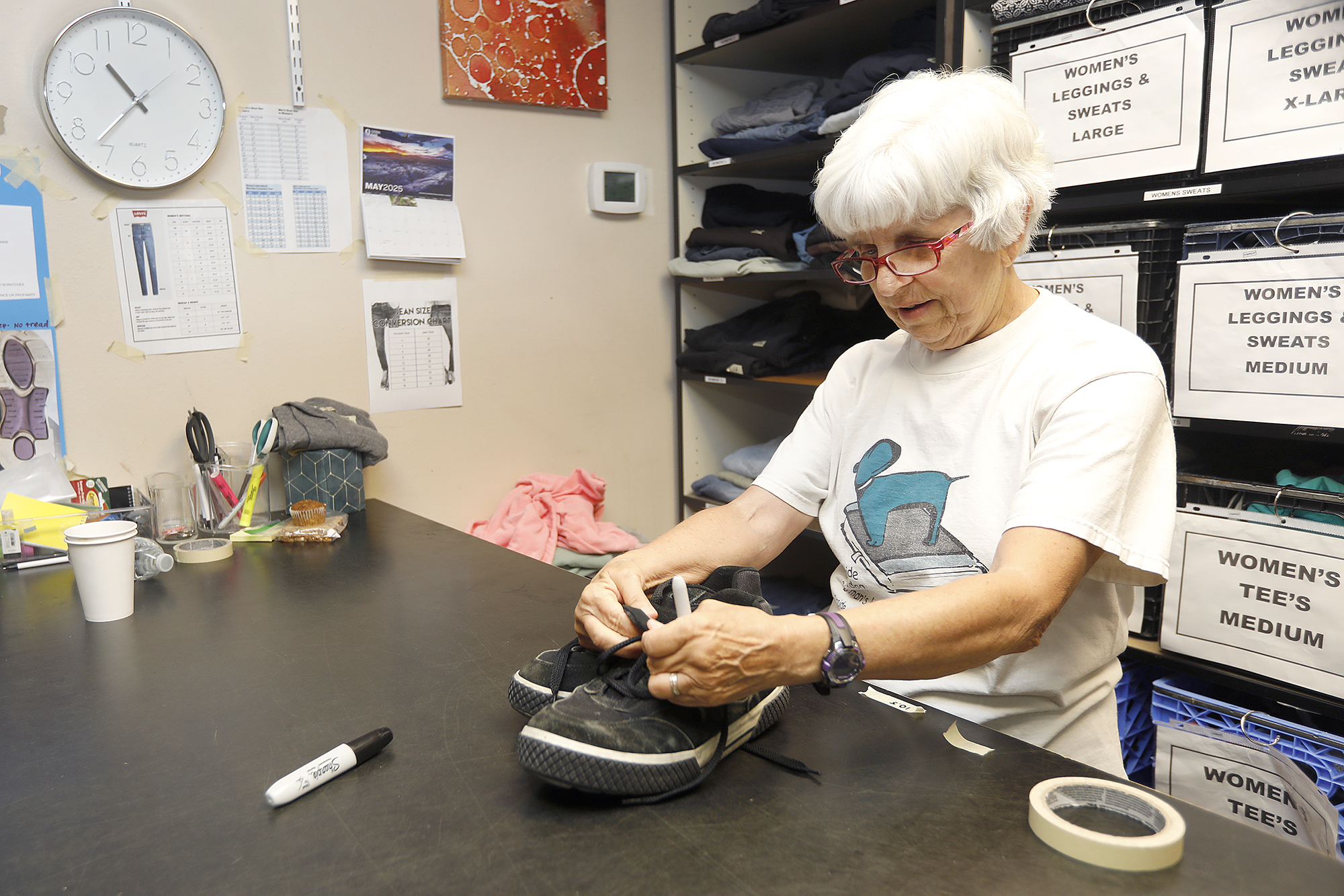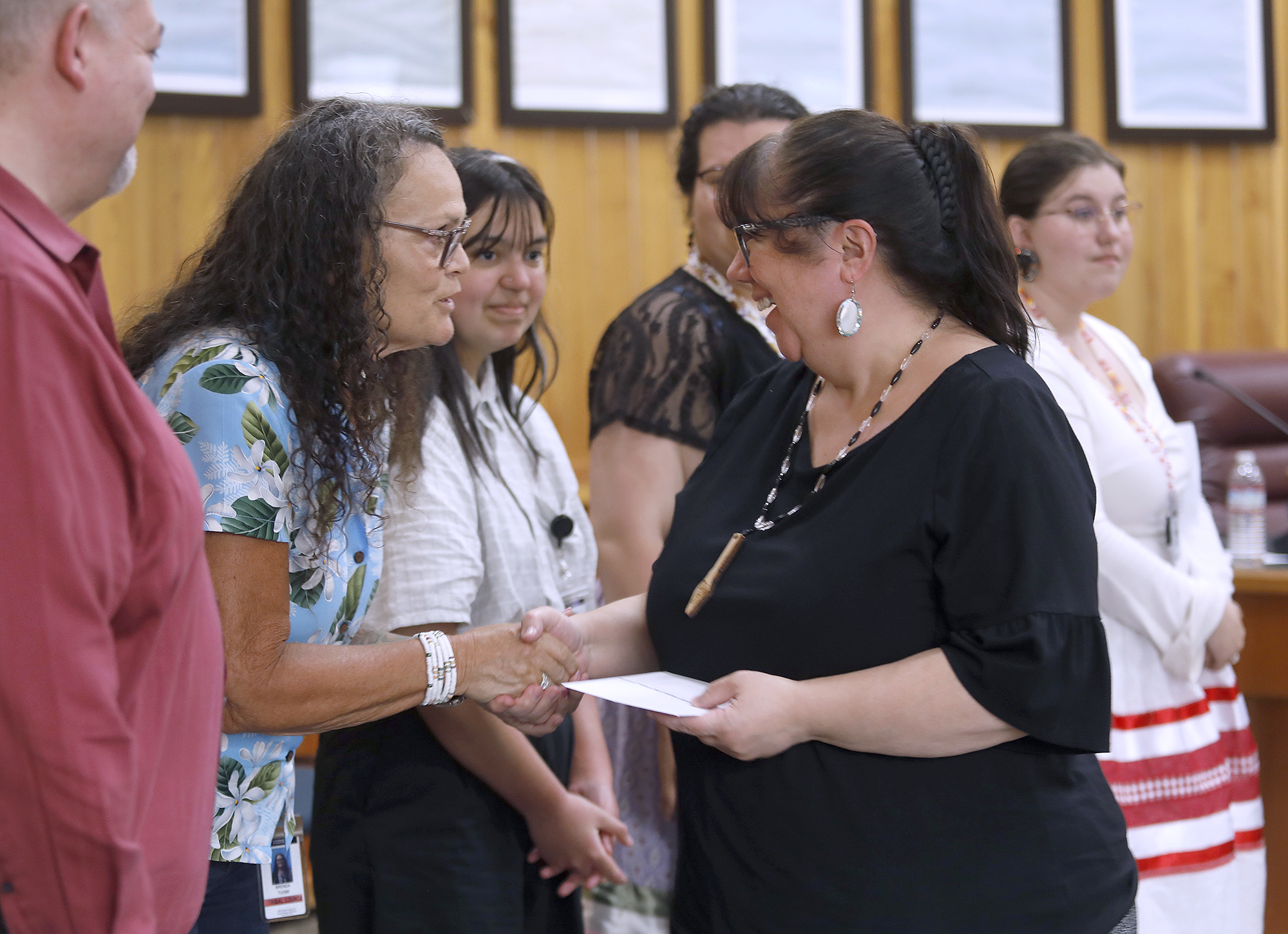Tribal Government & News
Community Fund surpasses $101 million mark in giving

By Nicole Montesano
Smoke Signals staff writer
So many organizations applied for large grant funding from the Spirit Mountain Community Fund for its second quarter awards that the Tribe was able to fund only 15% of them, Community Fund Executive Director Angie Sears told the recipients gathered in the governance center Wednesday, June 18.
“Our large grant program has always been competitive, but lately, it has become incredibly competitive,” Sears said. “So, if you’re here with us today, that means that the work you do is so important to us, and we thank you for that work that you do.”
The Tribe created the Community Fund as part of its gaming compact with the state of Oregon. It is supervised by an eight-member board of trustees that includes Tribal Council members Brenda Tuomi, serving as chair; Denise Harvey, serving as secretary/treasurer and Kathleen George. It receives 6 percent of the proceeds from Spirit Mountain Casino and awards the money to nonprofits in 11 northwest Oregon counties, in the following categories: Arts and culture, environmental preservation, education, health, historic preservation and public safety. Grants also go to the nine federally recognized Tribes in Oregon under the fund’s Tribal Grants program.
Tribal Council Secretary Jon A. George gave the invocation and performed a drum song.
Tuomi told attendees that since its inception, the Community Fund has given out 3,427 grants totaling $101.1 million.
“Serving on the Spirit Mountain Community Fund is a blessing,” Tuomi said, adding that giving out grants is one of her favorite duties.
In honor of reaching $100 million in grants last year, the Tribe designed a new commemorative blanket, which was presented to representatives for the American Military Encouragement Network after a drawing. The Tribe also held drawings for three beaded necklaces, which were presented to representatives for Family Building Blocks, the National Indian Child Welfare Association and Raphael House of Portland.
Cheryl Bickle, Executive Director and Principal of the Community Transitional School in Portland, and Lynn Gaffney, Lead Care Coordinator of The Father’s Heart Street Ministry in Oregon City, spoke briefly about what it means for their organizations to receive the grants.
The elementary school was founded in 1990, for children whose families are homeless or in transition and it was the second grant the school has received from the Community Fund, Bickle said.
“I do remember the first time we got a significant grant and it was from Spirit Mountain,” she said. “They had faith in us and in the beginning, hardly anyone had faith in us. There were times I wondered myself.”
Today, the school has been in operation for 35 years. It provides transportation to ensure the children are able to attend, even if they are moving frequently among shelters, motels, friends’ homes and even family cars. The school also provides a clothes closet and personal hygiene items.
“What I think our kids need is to be told over and over is that they are important and they can succeed,” Bickle said. “I just want all of our students, to, when they leave our school after eighth grade, to go to high school. It is the biggest challenge they face. … and then, I tell them the next thing we want them to do after they leave us, is to find something you want to do in life.”
Gaffney, who runs the medical care program for The Father’s Heart, said the grant will enable the program to pay for items such as medicine, medical co-pays and similar assistance.
“The homeless population have the same needs we do; they need band aids and cough syrup,” Gaffney said. But even relatively minor expenses can put badly needed items out of reach of an indigent population, she said.

Tara Reynon, right, a senior program director for the National Indian Child Welfare Association, shakes hands with Tribal Council member and Spirit Mountain Community Fund Board of Trustees Chair Brenda Tuomi as she accepts a check during the SMCF’s second quarter check presentation in the Governance Center Atrium Wednesday, June 18. (Photos by Michelle Alaimo)
In total, five small grants worth $34,500 and 12 large grants worth $543,876 were given to the following organizations:
Small grant recipients:
- Camp Rosenbaum, $7,500 for Youth Citizenship Camp;
- Community Transitional School, $7,000 for its transportation program;
- Every Child Lane County, $7,500 for support for Lane County foster youth;
- Inside Out Network Inc., $5,000 for Transforming Oregon Reentry;
- Yamhill Carlton Together Cares, $7,500 for expanding services to community children.
Large grant recipients:
- American Military Encouragement Network, $50,000 for food box support for military, veterans, Tribes and families in need;
- Family Building Blocks, $100,000 for Doris’s New Place, a permanent relief nursery for the Santiam Canyon;
- Impact NW, $50,000 for Early Childhood Services: Healthy parent-child development;
- Kinship House, $50,000 for mental health therapy for children in foster care;
- Life Strategies Counseling, DBA Life Counseling, $44,876 for expanding free mental health support for immigrant and at-risk youth;
- Looking Glass Youth and Family Services Inc., $30,000 for Riverfront School and Career Center’s skilled trades program;
- National Indian Child Welfare Association, $50,000 for Oregon Native Family Resources Project;
- Portland Gay Men’s Chorus, $30,000 for creating safe space for 2SLGBTQ+ for 45 years;
- Raphael House of Portland, $20,000 for family housing services for Portland’s three domestic violence shelters;
- Springfield Education Foundation, $24,000 for Chifin Native Youth Center Programs; Retaining a Sense of Belonging;
- Strengthening Rural Families, $45,000 for coordination, alignment and engagement for prevention in rural areas;
- The Father’s Heart Street Ministry, $50,000 for cost assistance program.
The Father’s Heart provides hope and help for people in poverty
The cost for the man’s blood pressure medicine prescription was only $11. But that was $11 more than he had and he was desperate.
“He was screaming and crying; he didn’t know what he was going to do,” Stephanie Hollingshead, Day Center Program Manager for The Father’s Heart Street Ministry in Oregon City, recalled.
Fortunately, he had come to the right place for help. The ministry exists for exactly such moments and staff rushed to purchase the prescription for him.
“You could just watch that stress level drop,” she said.
The ministry offers a day shelter and inclement weather shelter, meals, transitional housing, showers, a clothing closet, basic over-the-counter medications and supplies, and assistance in applying for insurance, making medical appointments and more.
It has established its own small pharmacy, providing band-aids, sunscreen and other items. Hollingshead said it has also partnered with hospice, to accept items such as unused medications after a loved one dies.
A year ago, the ministry brought on Hollingshead’s mother, Lynn Gaffney, who has a background in skilled nursing care coordination, to run its medical care program for both housed and unhoused clients.
Until recently, most of the expenses were coming out of staff pockets, as they could not bear to leave people in desperate straits, Gaffney said. Even relatively small costs can be insurmountable for people struggling with poverty, she said, such as parents faced with deciding whether it’s more urgent to purchase a bottle of cough syrup for a sick child or a loaf of bread to feed the family.
“It’s hard to know that for them, the barrier is so low,” Hollingshead said.
“Eleven dollars – it’s a cup of coffee,” for people earning a living wage, Gaffney said in frustration. But many of their clients are unable to work or don’t earn enough to live on. And insurance often leaves wide gaps between what it will cover and what people can afford.
In the case of one man, Hollingshead said, staff were able to pay the pet deposit for a motel room, so that he could recuperate from a wound indoors and keep his dog with him.
“He was willing to stay outside and let the wound get worse,” she said, rather than leave his beloved dog, because the program that provides temporary motel rooms for care doesn’t cover pet deposits.
A few months ago, Gaffney applied for a grant from the Spirit Mountain Community Fund, and to much surprise and relief, the ministry’s medical care program was awarded $50,000.
The money will go for a variety of needs: Ensuring people can obtain their prescriptions or pay their co-pays for medical care; buying durable medical equipment that insurance won’t cover or that have long wait times, such as shower grab bars for people at risk of falling in their homes, providing transportation to medical appointments, and more,” Gaffney wrote in her grant application.
She continued, “In just one year, our care team has successfully navigated over 80 new patient appointments, 14 new dental appointments and facilitated two open-heart surgeries, showcasing the demand for our services and the critical role we play in the community. Access to these flex funds would enable us to purchase essential items as soon as a need is identified, eliminating delays and providing immediate support to those in crisis.”
With the award, she wrote, within the first year, the program plans to provide immediate access to over the-the-counter medications for at least 300 clients; provide durable medical equipment for at least 100 clients; assist at least 100 clients with co-pays for prescriptions, establish a fund for the costs of specialized counseling services, work with local healthcare providers and organizations to create a referral network and implement a transportation assistance program to provide reliable transportation for at least 100 clients.
“This is such a great honor; we’re so excited,” Gaffney said. “It will be hundreds and hundreds of people – in a year’s time, 1,000,” that the grant will enable the ministry to assist.
